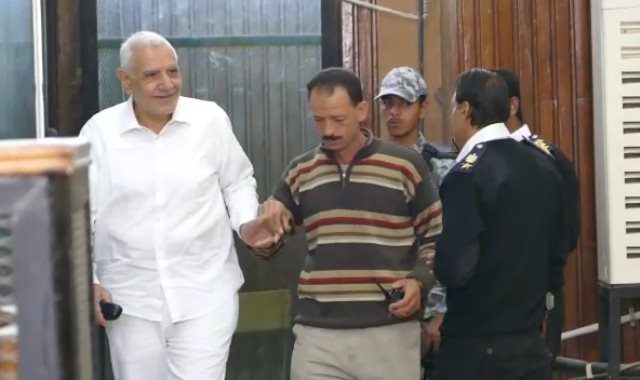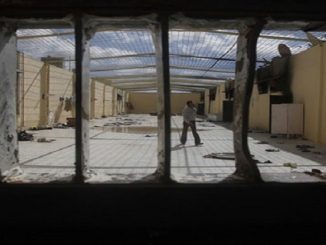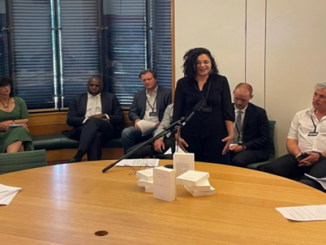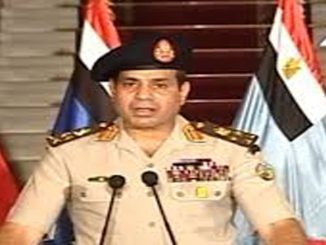
The Egyptian State Security Prosecution decided on Tuesday, 31 August 2021 to refer Dr. Abdel Moneim Aboul Fotouh, head of the Strong Egypt Party, his deputy, Mohamed Al-Qassas, and others to the Criminal Court, pending Case No. 440 of 2018 State Security.
On August 4, the Supreme State Security Prosecution in the Fifth Settlement (El Tagamoa El Khamis), east of Cairo, summoned Dr. Abdel Moneim Aboul Fotouh from his jail to complete investigation with him in Case No. 440 of 2018 State Security “Investigation”.
However, Dr. Aboul Fotouh was returned back to his cell to continue serving the pretrial detention period issued in connection with Case No. 1781 of 2019, means that the 70-year-old has just spent four years in pretrial detention without trial.
According to lawyer Khaled Ali, a member of the defendant’s defense team, the prosecution charged Dr. Abul-Fotouh with 5 charges: assuming leadership in a terrorist group, committing a crime of financing terrorist groups, possessing weapons and ammunition, promoting the ideas of a terrorist group, and broadcasting false news, statements and rumors at home and abroad.
In the last investigation session, Aboul Fotouh’s lawyers expected that a decision would be issued by the Public Prosecution office to refer this case to trial on these charges, after the expiry of periods of the pretrial detention without releasing them, or referring them to trial; where Aboul Fotouh was supposed to be released last February, after the expiration of his two-year pretrial detention, since his arrest on February 14, 2018.
It is noteworthy that the Court of Cassation ruled on February 1, 2020, to accept the appeal against listing Dr. Abdel Moneim Aboul Fotouh, head of the Strong Egypt Party, his son and others on the lists of terrorists, and to reconsider the listing request before another criminal department.
The South Cairo felonies had included Aboul Fotouh and others on the lists of terrorists, based on the Public Prosecution’s memorandum in Case No. 440 of 2018 limiting the security of a supreme state, in which they are accused of incitement against the state, calling for the suspension of the constitution, boycotting the presidential elections, belonging to the international organization of the Muslim Brotherhood, and contacting leaders The Brotherhood fled abroad, overthrowing the regime, threatening national security, overthrowing the state, and spreading chaos.
Aboul Fotouh’s detention
Aboul Fotouh was arrested in February 2018 upon his return to Cairo from London. The lawyer was investigated on the case 440/2018, which links him to the outlawed Muslim Brotherhood.
The Prosecution accused Aboul Fotouh of five charges: leading a terrorist organization, funding terrorist organizations, owning arms and ammunition, promoting the ideology of a terrorist organization and spreading false news and propaganda inside and outside the country.
Aboul Fotouh’s arrest in 2018 came one day after his return from a trip to London, during which he was interviewed by the Qatari satellite channel Al Jazeera. In the interview, he criticized current Egyptian President Abdel Fattah Al-Sisi, who orchestrated a bloody military coup against the democratically elected President Mohamed Morsi in 2013.
He has previously been detained more than once under the government of long time Egyptian dictator Hosni Mubarak.
Aboul-Fotouh’s suffering
During the first three months following his arrest, the prominent opposition politician Dr. Abdel Moneim Aboul-Fotouh was denied visits; after that, his family was granted weekly visits in the presence of security guards, but these were suspended for ten days in February 2019. All subsequent visits have been in the maximum-security prison, where he is separated from his family by a glass barrier. He was prohibited books, newspapers, a telephone, and a radio, which has left him totally isolated from the outside world.
Dr. Aboul-Fotouh may soon meet the grim fate of former president Mohamed Morsi, unless there is immediate intervention to put an end to pervasive medical neglect in Egypt’s prisons; a practice that has become, in effect, a prolonged death sentence inflicted in retaliation for political opposition. As a result of the Egyptian authorities’ deliberate denial of vital medical treatment, Aboul-Fotouh’s health has sharply declined, and he now faces imminent death unless urgent action is taken.
Aboul-Fotouh, the president of the Strong Egypt Party, has been imprisoned for more than two years on spurious charges in retaliation for his political opposition to Abdel Fattah al-Sisi, whom he had criticized publicly in several media outlets just days before his arrest by plainclothes police officers during a party meeting at his home.
The 70-year-old’s life is now in grave danger as a result of prolonged and deliberately inflicted medical neglect. The prison administration, and the judicial and executive authorities, continue to arbitrarily deny Aboul-Fotouh direly-needed healthcare for his chronic illnesses, which include diabetes, hypertension, and chronic heart and prostate conditions requiring surgical intervention.
Not only have his existent illnesses been exacerbated, Aboul-Fotouh now suffers from additional health conditions borne of the cruel and inhumane conditions of his solitary confinement in Tora Prison. He is denied any time outdoors or exercise outside of his isolated cellblock; his only contact with sunlight or fresh air occurs during restricted family visits and court hearings, which he now attends in a wheelchair due to increasingly acute spinal issues. Aboul-Fotouh’s blood pressure is dangerously elevated due to the prison authorities’ denial of his medications, and he has suffered reoccurring heart attacks, most recently last week on June 28th and 29th.
Mohamed Al-Qassas’s crisis
As for Mohamed Al-Qassas, the deputy president of the Strong Egypt Party, he was recycled within three different cases, the first is Case 786 of 2020, where he obtained a release, but unfortunately he found himself recycled in connection with Case 977 of 2017 and Case 1781 of 2019. Surprisingly, he was finally investigated in connection with Case 440 of 2018, and, as usual, on charges of belonging to a banned group.
Al-Qassas was arrested on February 8, 2017, and was included in Case 977 of 2017, known in the media as “Mekameleen II”, in which he faced accusations of participating with the Brotherhood in inciting against state institutions and holding organizational meetings with members of an armed movement, to implement operations in conjunction with the presidential elections, and the dissemination of false news, where his detention continued since then, revolving in connection with various cases.
Al-Qassas was a member of the Revolution’s Youth Coalition (RYC) and the founder of the Egyptian Current Party, a revolutionary youth party opposing both the Muslim Brotherhood (MB) and the army’s intervention in politics. Then, he joined the Egypt Strong Party headed by Dr. Abdel Moneim Abouel Fotouh, where he became its deputy president.
In January 2017, al-Qassas was placed on the terrorist lists, among 1,500 figures, most notably former Egypt’s national football star Mohamed Abu Treika, upon a decision by the Cairo Criminal Court that will last for three years.
This wasn’t the first time al-Qassas languishes behind bars; he previously endured the darkness of prison before the January uprising.
Al-Qassas’s detention and suffering
Al-Qassas was attending a wedding party of one of his friends. After the party is over, he took his car and it was 5 PM on the 8th of February 2018, but shortly thereafter he ‘disappeared’. In the meantime, the security forces broke into the house of al-Qassas in the absence of its inhabitants.
Then the next day, he appeared before the Attorney General of the Supreme State Security Prosecution, who ruled to imprison him for 15 days pending investigations on charges of; cooperating with the Muslim Brotherhood in the incitement against state institutions and holding organizational meetings with members of the MB-affiliate armed movement to carry out operations in conjunction with the presidential elections.
The Prosecution also accused the defendant of; spreading false news on the country’s political and economic situation with the aim of disturbing the general peace, within the framework of the terrorist Muslim Brotherhood group’s objectives, and propagating the group’s goals which include undermining trust in the Egyptian state and its institutions. The charges come as part of the case No. 977/2017, known in media as “Mekameleen II” case, which also involves: Islam al-Refaei, photojournalists Ahmed Hamouda al-Sakhawi and Ahmed Abdul Wahab Mohamed Ali, journalists Ahmed Abdul Aziz and Hossam al-Suweifi, and others.
On 15 February 2018, the Supreme State Security Prosecution decided to hand over al-Qassas’ house and car to his family, after the security forces seized them following his arrest. His wife Mrs. Iman al-Badini had been prevented for 55 days from entering the house. She posted on the social networking website “Facebook” what she said in her testimony that some of the house’s items were stolen:”Thanks God, the apartment has just been handed over to me, but the gold jewels belongs to me and my daughter “Zeina” as well as my husband, family and friends’ gifts to me and my daughter were stolen. Of course, the police refused to hand over it under a communiqué, and that’s why I couldn’t prove anything”.
The violations al-Qassas was subjected to included: being held in solitary confinement inside the notorious (Aqrab) Scorpion Prison, seizing his house and car for more than 44 days, stealing his house’s items and contents, denying family visitation for more than 70 days, preventing him from reading newspapers or books in prison, denying him any physical activity or daily exercise, demonizing him in media, and accusing him of terrorism by some of the non-professional regime-backed TV channels and newspapers.



